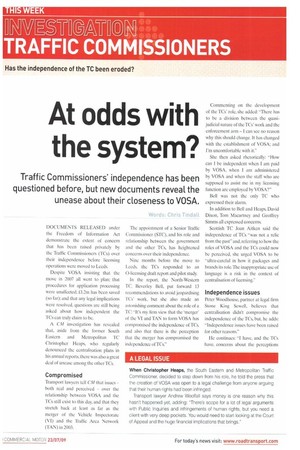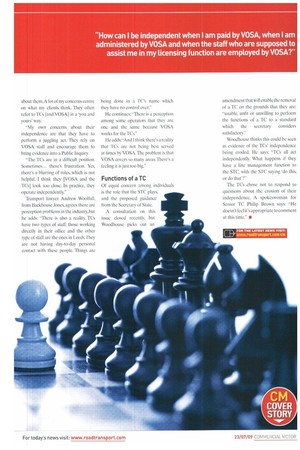At odds with the system?
Page 20

Page 21

If you've noticed an error in this article please click here to report it so we can fix it.
Traffic Commissioners' independence has been questioned before, but new documents reveal, the unease about their closeness to VOSA.
DOCUMENTS RELEASED under the Freedom of Information Act demonstrate the extent of concern that has been raised privately by the Traffic Commissioners (TCs) over their independence before licensing operations were moved to Leeds.
Despite VOSA insisting that the move in 2007 all went to plan; that procedures for application processing were unaffected; £1.2m has been saved (so far): and that any legal implications were resolved, questions are still being asked about how independent the TCs can truly claim to be.
A CM investigation has revealed that, aside from the former South Eastern and Metropolitan TC Christopher Heaps, who regularly denounced the centralisation plans in his annual reports, there was also a great deal of unease among the other TCs.
Compromised Transport lawyers tell CM that issues both real and perceived over the relationship between VOSA and the TCs still exist to this day, and that they stretch back at least as far as the merger of the Vehicle Inspectorate (VI) and the Traffic Area Network (TAN) in 2003,
the appointment of a Senior 'Baffle Commissioner (STC), and his role and relationship between the government and the other TCs, has heightened concerns over their independence.
Nine months before the move to Leeds, the TCs responded to an 0-licensing draft report and pilot study In the report, the North-Western TC. Beverley Bell, put forward 13 recommendations to avoid jeopardising TCs' work, but she also made an astonishing comment about the role of a TC: "It's my firm view that the 'merger' of the VI and TAN to form VOSA has compromised the independence of TCs, and also that there is the perception that the merger has compromised the independence of TCs."
Commenting on the development of the TCs' role, she added: -There has to be a division between the quasijudicial nature of the TCs' work and the enforcement arm I can see no reason why this should change. It has changed with the establishment of VOSA; and I'm uncomfortable with it."
She then asked rhetorically: "How can I be independent when I am paid by VOSA, when I am administered by VOSA and when the staff who are supposed to assist me in my licensing function are employed by VOSA?"
Bell was not the only TC who expressed their alarm.
In addition to Bell and Heaps. David Dixon, Tom Macartney and Geoffrey Simms all expressed concerns.
Scottish TC Joan Aitken said the independence of TCs "was not a relic from the past" and, referring to how the roles of VOSA and the TCs could now be perceived, she urged VOSA to be "ultra-careful in how it packages and brands its role. The inappropriate use of language is a risk in the context of centralisation of licensing."
Independence issues
Peter Woodhouse, partner at legal firm Stone King Sewell, believes that centralisation didn't compromise the independence of the TCs, but, he adds: "Independence issues have been raised for other reasons."
He continues: "I have, and the TCs have, concerns about the perceptions about them. A lot of my concerns centre on what my clients think. They often refer to TC's [and VOSA in a 'you and yours' way.
"My own concerns about their independence are that they have to perform a juggling act. They rely on VOSA staff and encourage them to bring evidence into a Public Inquiry.
—The TCs are in a difficult position. Sometimes... there's frustration. Yes, there's a blurring of roles, which is not helpful. I think they [VOSA and the TCs] look too close. In practice, they operate independently."
Transport lawyer Andrew Woolfall, from Backhouse Jones, agrees there are perception problems in the industry, hut he adds: "There is also a reality. TCs have two types of staff: those working directly in their office and the other type of staff are the ones in Leeds. They are not having day-to-day personal contact with these people. Things are
being done in a TC's name which they have no control over.
He continues: "There is a perception among some operators that they are one and the same because VOSA works for the '1'Cs."
He adds:"And I think there's a reality that TCs are not being best served at times by VOSA. The problem is that VOSA covers so many areas. There's a feeling it is just too big.
Functions of a TC Of equal concern among individuals is the role that the STC plays, and the proposed guidance from the Secretary of State.
A consultation on this issue closed recently, but Woodhouse picks out an amendment that will enable the removal of a 'It on the grounds that they are: -unable, unfit or unwilling to perform the functions of a TC to a standard which the secretary considers satisfactory':
Woodhouse thinks this could be seen as evidence of the TCs' independence being eroded. He says: "TCs all act independently. What happens if they have a line management function to the STC, with the STC saying 'do this, or do that'?
The TCs chose not to respond to questions about the erosion of their independence. A spokeswoman for Senior TC Philip Brown says: -He doesn't feel it's appropriate to corn men t at this time." •








































































































































